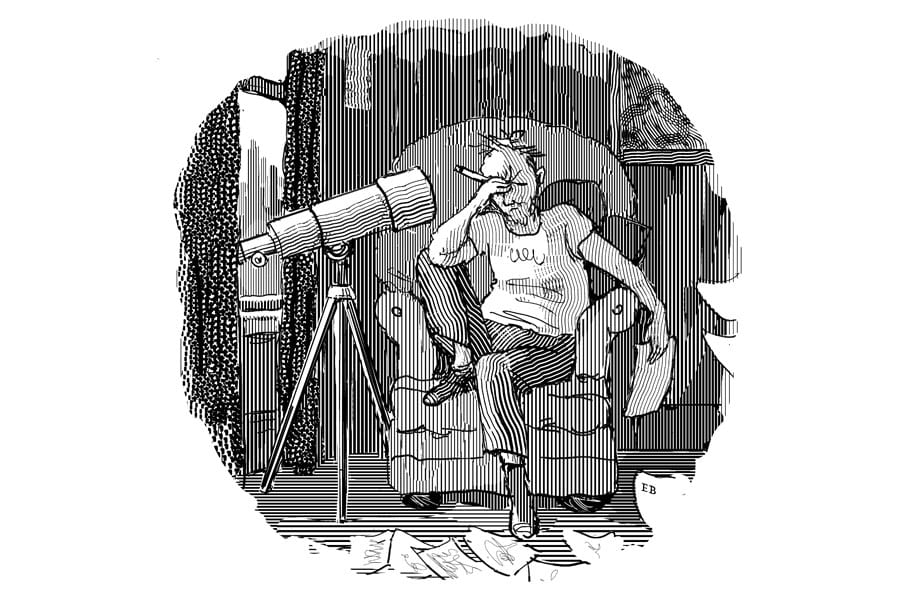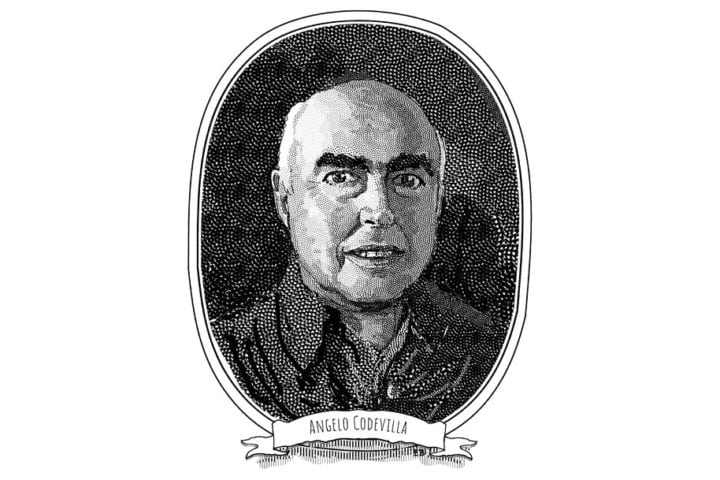Book Reviewed
George Packer is a good journalist, but he has written a bad book. Last Best Hope: America in Crisis and Renewal offers none of the deep reporting that characterized The Unwinding (2013), Packer’s justly praised book about the Tea Party response to the 2008 financial crisis. It is instead the hasty distillation of notes taken by an overwrought man who spent 2020 in his basement watching cable news, reading clickbait, and compulsively checking his Twitter account.
The results are, frankly, embarrassing. The “parasites” are always Republicans. The Trump years were a “nightmare,” during which “one unfit ruler at the head of a craven party and a nihilistic rebellion by a part of the people nearly destroyed self-government.” Claims about voter fraud are of course “lies.” Packer never misses an opportunity to describe Trump voters as “white,” which in the progressive lexicon amounts to a sneer that approaches the derisive meaning that what we now politely call the “n-word” had in my youth.
Like many commentators in recent years, Packer reaches for implausible analogies. “The year 2020 saw the most flagrant attempt to subvert democracy since Fort Sumter.” Our collective failure to don masks immediately marked a failure akin to “the fall of France in 1940.” The Trump Administration’s approach to the pandemic reminds Packer “of experiences I’ve had in other countries, like Iraq or Sierra Leone, where the state is too weak or indifferent to take care of its citizens, where the leaders are too corrupt or stupid to head off mass suffering.”
I could go on quoting Packer’s many effusions. But I will spare the reader. It’s sufficient to say that Last Best Hope does not report the thoughts of a calm, thoughtful man who wants to help us understand the social and political realities of present-day America. Yet, this does not make the book worthless. George Packer is an award-winning journalist, a member of the media elite (a staff writer at the Atlantic), and a representative voice of our liberal establishment. For this reason, Last Best Hope provides a useful glimpse of the hysterical sensibilities of the kinds of people who claim to provide responsible leadership.
* * *
The rants that masquerade as journalism spotlight an important fact about 2020: most of the people in Packer’s social class spent the year in anxious isolation. For a brief moment, the honest reporter in Packer wins out: “I had a lot of time for internet searches in 2020. Like tens of millions of the locked-down, I spent hours every day sitting on my ass, staring at a screen.” The admission indicates that Packer is no more informed about present-day American realities than any other frightened person who was “sheltering in place” last year. He ventured out to vote in November. Aside from that, Packer seems to have had no interactions with the Americans whom he so freely derides.
The same self-imposed isolation characterized a great deal of prestige journalism in 2020. By my estimation, the overwhelming majority of newspaper stories during the first few months of the pandemic were sourced on Twitter rather than with in-person reporting. I live in New York City. The eyes of the nation were on the metropolis in April and May 2020. Yet, aside from Nicholas Kristof, who wrote a powerful feature about his visit to an emergency room in the Bronx when the influx of patients was peaking, little on-the-ground reporting appeared. It was the story of a lifetime, and the mainstream media stayed at home.
The repetitive, sometimes unhinged diatribes that make up Last Best Hope reflect the larger failures of our journalistic establishment. Senior journalists like Packer are supposed to provide the larger perspective and high standards of reporting born of long experience. That perspective and those standards would have served the country well during June’s Black Lives Matter protests, looting, and unrest. And as the election season turned toward its bitter final stages, we needed good reporting. But the older set, so anxious not to get sick, were the least likely to go into the field.
And it was not just the reporters who failed to show up. The senior editors of our major newspapers and networks went into isolation, running their newsrooms remotely. They, too, sat on their butts in front of flickering screens, relying on internet pundits and Twitter mobs to determine what was important and newsworthy. In truth, most of our ruling class went into self-isolation, subsisting on virtual reality.
* * *
Yet, though there is no reason to think Packer has the slightest clue what happened to America last year, Last Best Hope is a trustworthy source for determining the effects which the self-imposed isolation had on the mentality of liberal elites. Like our president, who also spent most of 2020 in his basement, Packer pops off like every other unfiltered internet blogger. Joe Biden thinks nothing of tossing charges of racism—as when he likened Georgia’s efforts to prevent voter fraud to “Jim Crow on steroids.” Packer is just as uninhibited and aggressive. “The highest purpose of the Republican Party today is to hold on to power by undemocratic means,” readers are told. The “argument” for an alternative runs on clichés: “A way forward that tries to make us equal citizens, free to shape our shared destiny, is a road that connects our past and our future.”
Readers will not be surprised to discover that the “way forward” turns out be standard-issue progressivism. The good people who “follow the science,” and defend “our democracy” must win, while the bad people, those who support “a craven party and a nihilistic rebellion,” need to accept their dhimmi status and meekly submit to their betters.
At the end of this dog’s breakfast, Packer asserts, “Recently, we’ve been governed by some of the worst public servants in the history of the republic, people whose names belong on a National Registry of Governance Offenders with a mandatory lifetime ban.” I find that I agree. But I must add a further observation. Our elected representatives function within a governing consensus shaped by our country’s leadership class that includes university presidents, foundation heads, CEOs, editors of influential publications, and prominent journalists.
* * *
This leadership class has done great damage to America. After the Cold War ended, we enjoyed superordinate power. That global dominance was squandered in failed wars, most recently in Afghanistan. Our naïve engagement with China has empowered that country, which now threatens to turn us into a rich but subservient client state. Our leadership class refuses to control illegal immigration, and it sponsors a multicultural ideology that fragments the nation. Nearly one million people have died of drug overdoses in the past 20 years—and our leaders respond by legalizing marijuana. Marriage rates have plummeted and illegitimacy soars. Wages stagnate for working men and women. Cities are overrun by homeless people.
Let it not be said, however, that the last few decades have seen only bad news. During those years it has been very good indeed to be well-educated, well-connected, and well-compensated. People in George Packer’s set are richer than they’ve ever been. China may have sucked manufacturing jobs out of the American heartland, but Silicon Valley, Hollywood, and Wall Street have prospered and vast fortunes have been made.
The members of our leadership class are not just richer. They have also become more confident in their rectitude. Packer looks back on the Clinton years and notes the excesses of that era’s post-Cold-War confidence in the blessings of globalization. Honest people must allow that mistakes were made. But when Packer turns to Sarah Palin, whom he correctly identifies as a precursor to the anti-elite populism that put Trump in the White House, his tone changes. The former Alaska governor exemplifies “proud ignorance” and “unrestrained narcissism.” She appealed to the degraded losers in America, who are inevitably “white.” What she represents is vicious, not mistaken.
Son of Stanford professors, Yale graduate, and Peace Corps volunteer, Packer is one of the best and the brightest. Last Best Hope drips with the angry and increasingly desperate denunciations that have become more commonplace as the failures of the Ivy League set have become more obvious. Let it be noted that Sarah Palin was not so stupid as to bring China into the World Trade Organization. She did not cook up utopian programs for worldwide democracy promotion. She did not support the multicultural ideology that has metastasized into today’s woke revolution. She did not oversee economic policies that led to wage stagnation for working-class Americans and then to a financial crisis that required bailouts that made rich people richer. Nor did she cheerlead for lockdowns that, yet again, made the rich richer still.
Nevertheless, Palin and Donald Trump and their deplorable supporters are the object of Packer’s unstinting derision. A great deal of Last Best Hope offers long-form versions of what I’ve heard for more than a decade. Liberal elites have become remarkably frank in their hatreds. They are so confident in their virtue that they can say out loud that half their fellow citizens are racist, which in our time amounts to saying that they don’t deserve to live in this country.
* * *
Which brings me back to Packer’s idea of a National Registry of Governance Offenders. He certainly deserves to have his name inscribed. During the most eventful months of recent memory, he was missing in action, satisfied to take potshots at cartoon targets rather than providing deeply sourced journalism.
Packer is sadly typical. As Charles Murray has documented in Coming Apart (2012) and elsewhere, in recent decades the best and the brightest have hived apart from the rest of society. They don’t just live in separate communities from everyone else. They’ve also engineered an economic system that serves them nicely—but not their fellow citizens. They’ve been eager to project power with a military in which their children do not serve. They’ve insisted upon an affirmative action regime from which they exempt themselves. At each turn, Packer and many other authors of our nation’s misgovernment have served themselves rather well, thank you. Ordinary people? Not so much.
Our last best hope? When Abraham Lincoln coined the phrase, he meant America. When George Packer uses it, he means himself and the people like him. That is why I harbor some sympathy for the woke Jacobins. They are not wrong to attack the feckless establishment liberals who run our mainstream institutions. May they succeed in guillotining more than one Rhodes scholar. To my mind, our last best hope remains America, which is awakening to the fact that for far too long we have been misled.




